“No matter how busy you may think you are, you must find time for reading, or surrender yourself to self-chosen ignorance.”
Some people like to read. Other people do not. Since the age of Confucius, the people in the former camp have been judging those in the latter harshly. More recently, a new form of reading elitism has arisen – judgement against people who haven’t yet switched from paper books to digital ones. Even this author, normally the paragon of open mindedness and wonderfulness, will confess to patronizingly acting surprised when encountering someone who still reads using the “dead tree format.”
If the self-appointed “elite” members of society avidly read, then the “elite of the elite” must avidly e-read, right? Who are these people and where do they live? That city must surely be the most elite and cultured city in America. As a company based in San Francisco, we naturally assumed that the most literate, cultured and forward-thinking people live here. Of course there are philistines who prefer less cerebral pastimes, but they probably live in unseemly places like the South, Midwest, and Portland.
It turns out all of our preconceived notions about e-reader adoption was wrong. When you dig into the data about where Kindles are actually bought and sold, the most “cosmopolitan” cities in America are soundly beaten by mid-sized cities in the Midwest and South. Moreover, our data suggests that dedicated e-readers aren’t very popular devices anywhere. In the landscape of consumer electronics, e-readers barely register.
The Kindle Index: e-Literacy in America
To identify the most electronically literate places in America, we analyzed the Priceonomics database of eight million electronics for sale by city. We examined how prevalent the Amazon Kindle was by city to rank how popular e-reading was across the nation (we also examined Nook sales, which didn’t change the results). To our surprise, the most populous and culturally-reputed cities in America did not rank among the most digitally literate.
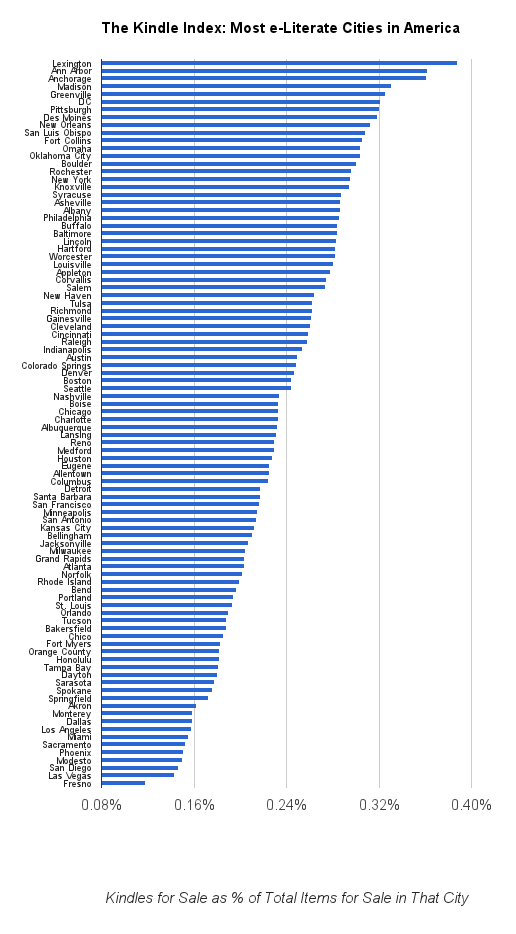
Lexington, Kentucky is the most e-literate city in America. On its heels are Ann Arbor, Michigan and Anchorage, Alaska. Congratulations, nerds!
A few observations from the rankings:
- Major metropolitan cities like San Francisco, Seattle, Miami, Chicago and LA get crushed in these rankings. I guess we’re not as cultured and awesome as we originally thought!
- College towns like Lexington, Madison and Ann Arbor fare the best in Kindle ownership.
- Fresno, CA is the most digitally illiterate city in America. We are very disappointed in you. Same goes for Las Vegas and San Diego where a commitment to reading books on electronic devices is noticeably absent.
“I’m really disappointed you don’t read more, Fresno.”
We couldn’t help but notice that the Kindle was least popular in places with the best weather. Perhaps people are off surfing and climbing trees instead of reading books? Seems unlikely.
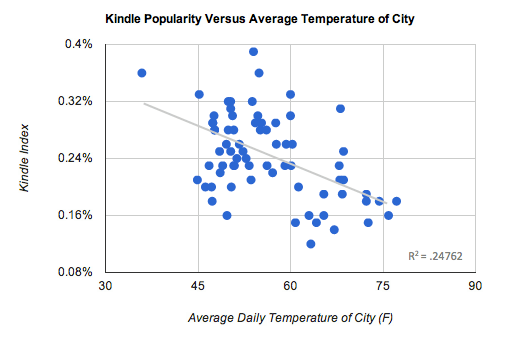
Is there any truth to the hypothesis that more educated people tend to use e-reading devices? Our data found only a very weak correlation between Kindle prevalence and the percent of the population that was college educated.
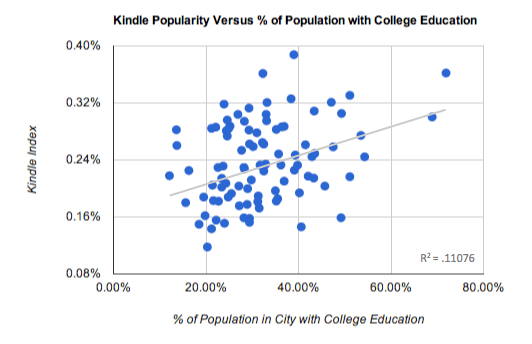
Ultimately, what stood out to us the most was that the Kindle actually wasn’t very popular on secondary markets. Given the amount of marketing and press that brand receives, the product barely registers on secondary markets. For example, at any given time there are 6 times more Xboxs available for sale than Kindles.
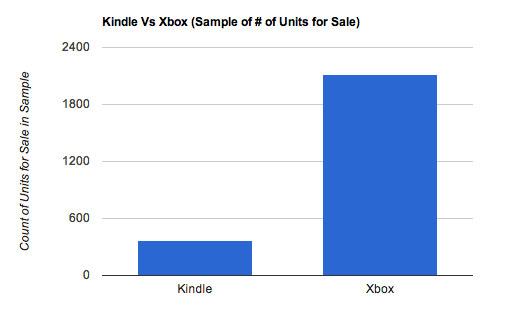
For whatever reason, Kindles just aren’t that popular on secondary markets. Is it because they’re already cheap, new models come out frequently, or are they just not that popular? It’s an open question for now.
Kindle vs Nook vs 800 LB Gorilla
The market for e-readers basically has only two players, Amazon and Barnes and Noble. According to our resale market data on quantity of e-readers for sale:
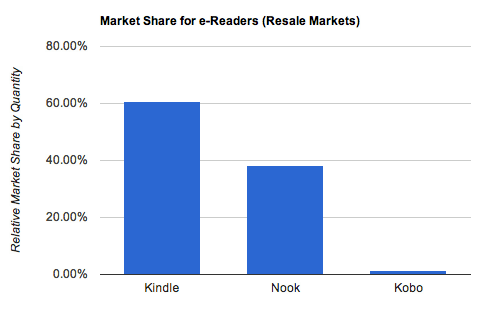
On secondary markets, the Kindle models makes up ~61% of items for sale and the Nook models ~38%. Before Amazon congratulates itself too heartily, let’s add the Apple iPad to the equation:
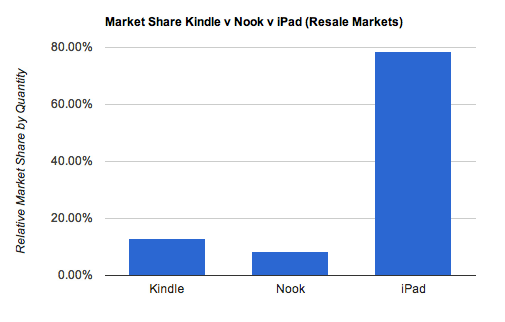
Kindles and Nooks aren’t really competing against each other so much as both of them are holding on for dear life versus the iPad. From Apple’s perspective, the entire e-reader market looks like a rounding error.
The Price of e-Readers
John Walkenbach has an amazing insight on his blog about the price of a new Kindle over time. We’re recreating it below, and comparing it to the price of an entry level iPad.
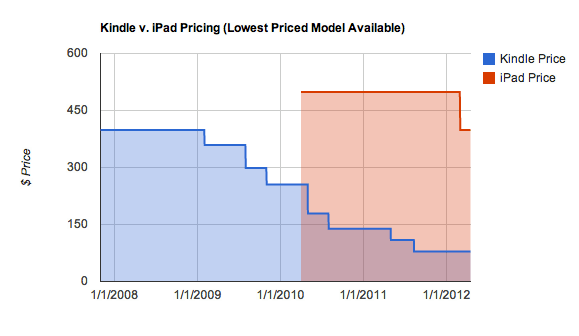
Astoundingly, the price of new Kindle is inexorably falling to zero. At the same time, the least expensive iPad has stayed at $499 until recently when a $399 model became available.
On one hand, this chart shows the different philosophies of Amazon versus Apple. As Jeff Bezos wrote when the Kindle Fire launched:
“There are two types of companies: those that work hard to charge customers more, and those that work hard to charge customers less. Both approaches can work. We are firmly in the second camp.”
On the other hand, Apple’s ability to dominate market share while barely flinching on price seems enviable.
Conclusion
“One of my tricks for generating startup ideas is to imagine the ways in which we’ll seem backward to future generations.”
– Paul Graham, Frighteningly Ambitious Startup Ideas
By this heuristic, it seems likely that paper books will be 100% replaced by e-books. At the onset, we assumed that cities like New York and San Francisco would be leading this charge into the future, but we were wrong. Instead, it’s the college towns and and mid-sized cities that are the vanguards of e-reading. Even still, dedicated e-reading devices aren’t even that popular despite their head start in the market versus the iPad. If the future of reading is electronic, it may well be completely dominated by Apple.
Comment on this post on Hacker News.
Oh yeah, Priceonomics is hiring a Front-end Engineer!
This post was written by Rohin Dhar. Follow him on Twitter here or on Google Plus. Get the latest from Priceonomics on Facebook or Twitter.




